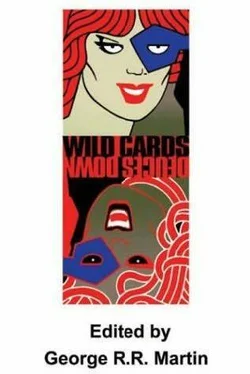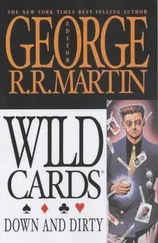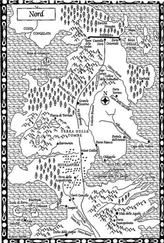“For a proper simulation,” he said, clearly disgusted with my lack of professionalism.
I turned, hoping to re-connect with Eva-Lynne, but Commander Dearborn chose this moment to emerge from the hangar.
He was wearing a heavy, silvery garment like a diving suit, complete with a neck ring. Under one arm he carried white helmet. He seemed completely focused on the task ahead of him, like a bullfighter I had once seen in Tijuana.
Tominbang was a step behind him, but compared to Dearborn ’s glittering presence, might as well have been invisible.
(I noticed one strange face in the crowd, not far behind Dear-born: Sampson, his backup pilot.)
Dearborn stopped and looked up at Quicksilver, which had now been towed to a distance of fifty yards from the hangar door. He raised his helmet, lowered it over his head, locked it into place.
Some of the team members applauded . I felt an unfamiliar surge of pride. From what I could see of Tominbang’s face, so did he.
And, for a moment, so did I. I was part of that crew!
The next half hour raced past. Dressed in street clothes (but carrying a crash helmet handed to me by Kafka), I joined Dearborn and Tominbang aboard Quicksilver. I had never been inside the vehicle before, and had to be helped down through the top hatch into the newly-installed airlock by Sampson. (“This is where the weapons bay used to be.”) Then I crawled forward into the cabin and wrenched myself to the left-hand seat. (There were three, one forward, and two behind.
“I hope I don’t have to get out of this thing in a hurry,” I said, half-joking.
“The pilot can blow the canopy for emergency egress,” Sampson said, his eyes bland and almost sleepy. I decided right then that I didn’t much like him. Maybe it was the air of truly unpredictable strangeness he radiated-his “wrong way” wild card, no doubt.
As the team cleared out, my helmet radio squawked. “Pilot to Co-pilot,” Dearborn said, “that pistol grip tiller close to your right hand is your lifting mechanism. It is finely calibrated to connect with the center of mass of this vehicle. Touch it only when you do your lifting.”
“Uh, roger,” I said, trying to sound astronautical.
There was some chatter on the radio that did not directly concern me. Next to me, Tominbang practically bounced up and down like a restless child.
Dearborn counted down to ignition, and pressed the start button. Flame shot out of the back of Quicksilver. In a cloud of debris, the pumpkin-seed vehicle started rolling down the runway. It rotated almost immediately, then headed straight up into the night sky…
I felt some pressure, but not much more than on an airplane. For the first few moments, that is. The pressure kept building and building, and to my extreme discomfort, we rolled to our left and over on our backs. “Why are we doing this?” I said between clenched teeth.
“Aerodynamics don’t apply here,” Dearborn said, almost cackling with glee. “It just lets our radio antennas communicate with the ground.”
Then he said, “First waypoint, Co-pilot. Give her a little lift.”
As I’ve said, annoyance is my perpetual state, and it quickly transitions to anger.
We made a good test lift.

Twenty minutes late we were back on the ground, hatch opened. As I walked away, weak in the knees, I looked back to see Quicksilver glowing like a campfire coal on the runway.
A crowd surged toward us. Dearborn removed his helmet, he handed it to me. “Flies great, doesn’t she, Co-Pilot?”
I couldn’t help agreeing.
My elation was so profound that it wasn’t until an hour later, as the crowd finally thinned, as Quicksilver was towed back into the hangar, that I realized Dearborn was gone.
And so was Eva-Lynne.

He didn’t come home that night. I know, because I sat up until three.
Maybe that’s why, when the phone rang at six A.M., I was willing to face-no, to welcome-my next challenge. “Yes, Mr. Skalko.”

Mr. Warren Skalko gave no over sign of his power or his wealth. No flashy car. No expensive suits. No gold pinkie rings or necklaces. No thick-necked sideboys. (They were around, but you never saw them, unless you happened to realize that the occasional passing motorcyclist was probably one of them.) His golf game was average, and his bets were small-five-dollar Nassaus. Even his physical person was nondescript: at 50 he was of medium height, a little overweight, balding, his eyes swimming behind thick glasses. If you met him without knowing who he was, you would have thought yourself in the company of an accountant, and not one who handled large accounts.
At one point, early in our relationship, I was silly enough to ask him why he did what he did, when he seemed to live so modestly.
“I can’t help myself,” was his reply.
He always made his own calls, too. “Cash, Warren Skalko here,” he chirped. “Sorry about the early hour. Wondering if you’d have time to get together later this morning, around eight, at the usual place.”
Eight it was, at the driving range of a ratty municipal par-three in Lancaster. It was October now, and the desert nights were cold enough to leave frost on the fairways and greens. So the crowd at the driving range was sparse.
Only Mr. Warren Skalko taking some swings with a seven-iron. “Tominbang tested his plane last night,” he announced the instant I was within earshot. (That was another Skalko trait: getting directly to the point.)
I think my heart stopped for a good five seconds. Obviously Tominbang had a distant connection to Mr. Skalko. Less obvious was why Mr. Skalko would have any interest in his activities. Equally less obvious, but of much greater concern to me was whether Mr. Skalko was angry about my involvement. “Yes.”
“Think it’s gonna work? This flying to the Moon?”
I couldn’t help a reflexive smile. “I hope so.” It was, after all, my life.
“Oh, you’d be all right. That Dearborn fella, he’s got the luck.” Swish. Mr. Skalko launched a shot down the range. “But I’m not sure I like this deal,” he said.
This was not code for a stronger emotion. Mr. Skalko was a direct man: if he really hated Tominbang’s project, he would have said exactly that.
“I’m not sure of the value, either,” I said.
“Why are you doing it? The money?” Mr. Skalko knew everything he needed to know about my money problems.
“Yes,” I said, then adding, because he would know, anyway. “And a girl.”
“Ah. That’s even worse.” Swish went the club. “When is the big day?”
“We’re scheduled to take off in two weeks.”
Mr. Skalko examined the seven iron, and then, apparently deciding, he had had enough fun at the driving range, slid it back into his golf bag. “Tell you what,” he said, “give me a call when it looks as though you’re ready to go. No later than the day before, at the usual number.” He sighed and looked around at the country-side. “I need to think about what this means.”
There was never any doubt that I would agree to do whatever Mr. Skalko wanted.

It was only after putting miles between my car and Mr. Skalko that I began to feel troubled by my new status as a spy inside Tominbang’s project. My heart began to beat faster, my breathing grew ragged. It was as if I had just run a mile.
I would have been alarmed, but I had learned to expect this reaction. All I could do was pull off at the first auto salvage yard I came to.
Читать дальше
















